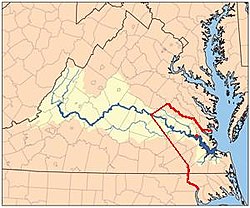Colony of Virginia
The Colony of Virginia (also known as Virginia Colony) was the first of thirteen colonies in North America.[1] The English first tried to make the Roanoke Colony in 1584. A war delayed resupply until 1590. When the ships arrived, the colonists were gone.[2] The decision to settle Jamestown again came from a group called the Virginia Company of London.[2] Virginia was settled again in 1607 at Jamestown, this time successfully. The Virginia Company had its charter revoked in 1624 for not showing a profit.[2] At that time the colony of Virginia became a crown colony.[2] It became a British colony after 1707.[3] It remained an English colony until the American Revolution.
The name Virginia was first applied by Sir Walter Raleigh and Queen Elizabeth I in 1584. After the English Civil War in the mid 17th century, the Virginia Colony was nicknamed "The Old Dominion" by King Charles II. He gave Virginia colony the name for its loyalty to the crown during the era of the Commonwealth of England.[4] When Virginia colony was first settled it was a huge geographic area that was England's claim on all of North America. After the United States was formed, the entire states of West Virginia, Kentucky, Indiana and Illinois, and portions of Ohio were all later created from the territory that was once known in the Colony of Virginia.[5]
Colony Of Virginia Media
The site of the 1607 Popham Colony is shown by "Po" on the map. The settlement at Jamestown is indicated by "J".
Map depicting the Colony of Virginia (according to the Second Charter), made by Willem Blaeu between 1609 and 1638
Map of the Iroquois expansion during the Beaver Wars, 1638–1711
Bermuda Hundred and other early English settlements upriver of Jamestown
References
- ↑ "A History of Jamestown". Jamestown-Yorktown Foundation. Retrieved 8 February 2016.
- ↑ 2.0 2.1 2.2 2.3 "Colonization in the New World". Teaching American History in South Carolina Project. Archived from the original on 9 February 2016. Retrieved 8 February 2016.
- ↑ The Royal Government in Virginia, 1624-1775, Volume 84, Issue 1, Percy Scott Flippin, Wallace Everett Caldwell, p. 288
- ↑ "Old Dominion, Virginia State Nickname". State Symbols USA. Retrieved 8 February 2016.
- ↑ Charles A. Goodrich, The History of the United States of America from the Discovery of the Continent by Christopher Columbus to present time, (Hartford: H. F. Sumner & Co. 1873) pp. 35, 241
| Wikimedia Commons has media related to Colony of Virginia. |






